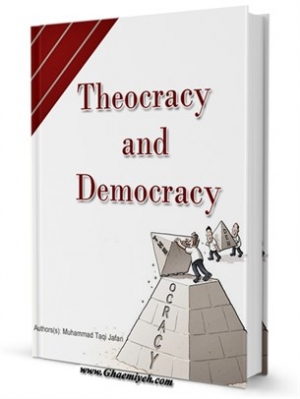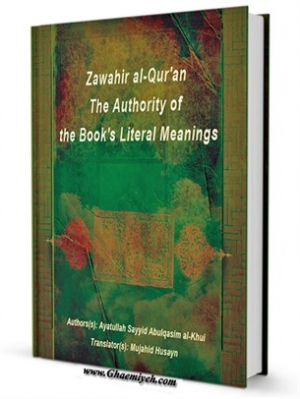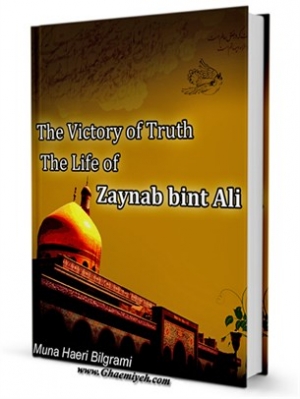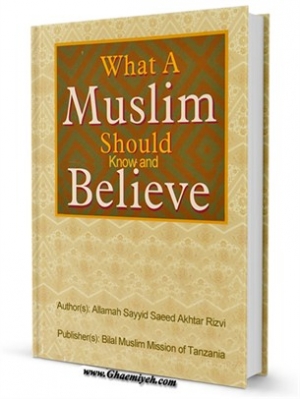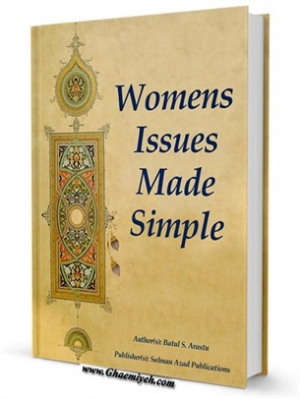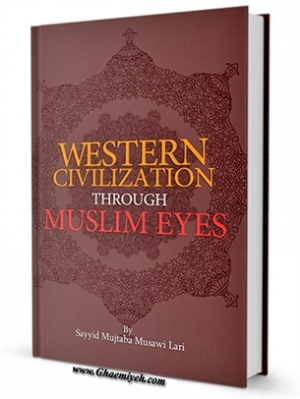Super User
Brief introduction
Words and advice of Prophet 'Isa (Jesus) found in Shi'i traditions, on subjects including God, man, the hereafter, wisdom, prayer, poverty, the heart, and much more. Selected, edited and translated by Mahdi Muntazir Qa'im and Muhammad Legenhausen.
Contents in brief
In the Qur'an, in a passage describing the annunciation to the Blessed Virgin Mary, Jesus ('a) is described as a Word from God:
“O Mary! Verily Allah gives you the glad tidings of a Word from Him; his name is the Messiah, Jesus son of Mary, eminent in this world, and in the Hereafter of those near [to God]” (3:44)
The context in which this ayah was revealed was one of inter-religious encounter. It is said that the Christians of Najran sent a delegation to the Prophet of Islam (s) at Makkah to question him about the teachings of Islam concerning Jesus ('a), and God revealed the above and other ayat of Surat Al 'Imran in response.
The response is not only not a denial of Christian teachings, although the divinity of Christ is clearly rejected, but also an affirmation of much believed by Christians as well, even the designation of Christ as logos:
'O People of the Book! Do not go to extremes in your creed, and do not say of Allah but the Truth. Verily, the Messiah, Jesus the son of Mary, is only an apostle of Allah and His Word which He conveyed unto Mary, and a Spirit from Him (Qur'an 4:171)
So in addition to being called the Word of God, Jesus ('a) is also called a Spirit of God and in some of the narrations reported in the Shi'i tradition, this title is used.
Of course, the interpretation of the logos in Christian theology differs markedly from the interpretation of the kalimah by Muslim scholars. For the Christian, according to the Gospel of John, the Word was God and the Word became flesh.' For the Muslim, on the other hand, the Word is creature, even while it is the creative principle, for it is in God's utterance of the word 'Be'. That creation takes place.
To call Christ the Word of Allah is not to deify him, but to verify his status as prophet. Because of his high status as prophet, Jesus ('a) becomes a complete manifestation of God, one who conveys the message of God, one who can speak on behalf of God, the Word of God Jesus ('a) becomes the Word of God not because of an incarnation whereby his flesh becomes divine, but because his spirit is refined to such an extent that it becomes a mirror whereby divinity comes to be known.
Brief introduction
This book is written by Muhammad Taqi Jafari and translated by Ali Quli Qara'i. It is published by Ahlul Bayt World Assembly and is about "Theocracy and Democracy" in Islam, includes discussion of Shura (Consensus).
Contents in brief
The concept of theocracy or the sovereignty of God, admittedly, would sound strange and remote in a society as today's. Centuries and ages have passed without such ideas and concepts making any impression on the minds of those who have ruled and administered human societies or there being any discussion about them.
Moreover, the intellectual arena has been occupied by cults of sovereignty of kings or that of the people. That is why any scheme of deliverance of mankind from the bondage of egoism and self‑alienation appears vainglorious and farfetched.
Henceforth, it is the demand of a humane and truth‑seeking logic not to surrender our search in the despair and fear of an artificial intellectual atmosphere created by power‑hungry and egocentric rulers. Undaunted by the fearsome gallery of idols, we should courageously examine every kind of beneficial and promising truth.
But before everything, let us try to clear up the heavy mists that lurk around the concept of Divine sovereignty and dissociate it from the many layers of prejudice and ignorance that conceal its real face. There are two elements in the term theocracy: God (theos, god) and sovereignty (Kratein, to rule). We shall examine each of them beginning with God.
Brief introduction
This book is written by Sheikh Abdillahi Nassir and translated in English by Mohamed Raza Dungersi. Ph D. and its publisher is Bilal Muslim Mission of Kenya. This book corrects the claim made by those who say Yazid was Amirul Muminin (Commander of the believers), with proofs and evidence from the traditions (ahadith) of the Prophet (s) and the books of prominent Muslim scholars.
Contents in brief
“We are the slaves of Yazid and it is entirely upon him to either give back our freedom or sell us in the slave-market”
The people of Madina were forced to repeat the above words as a sign of accepting the rule of Yazid who reigned from 680 CE to 683 CE. Those who resisted had their heads chopped off.
The army of Yazid invaded Madina and Makka, the two holy cities of Islam.
Openly and publicly, Yazid rejected the belief in the Prophet of Islam. He mocked the Day of Judgement, made fun of the daily prayers (salat), wine being his drink and chess gambling was his favorite pastime at all times. He committed indecent acts even with his stepmothers and aunts. Does a person of this character and behaviour deserve to be called Amirul Mu’minin (Commander of the Faithful)?
This book is a translation of the original title Yazid Hakuwa Amirul Muminin authored in Kiswahili by Sheikh Abdillahi Nassir.
In this book Sheikh Abdillahi Nassir corrects the claim made by the Wahhabis that Yazid was Amirul Muminin, with proofs and evidence from the traditions (ahadith) of the Prophet (s.a.w.w.) and the books of prominent Muslim scholars.
When Walid bin Utbah bin Abi Sufyan, the Governor of Madinah, informed Imam Husayn that Yazid demands a pledge of allegiance from him, the Imam politely refused by saying that an allegiance in secret will be of no value, we shall see into this matter tomorrow in public.
But then Marwan bin Hakam, who was also present in the meeting, told Walid to force the Imam for pledging allegiance to Yazid or to kill him and send his head to Damascus.
At that time, the Imam said:
…We are the household of the prophethood, the source of messengership, the descending-place of the angels, through us Allah has begun (showering His favours) and with us He has perfected (His blessings). Whereas Yazid is a sinful man, a drunkard, killer of innocent people, and one who openly indulges in sinful acts. A person like me can never pay allegiance to a person like him…
Brief introduction
The author of the book is Ayatullah Sayyid Abulqasim al-Khui. It is translated into English by Mujahid Husayn. And this book is about the Importance of the literal meanings of the Qur'an and examples of its use by the Ahlul Bayt (a). Arguments against the literal meanings. Methodology and sources of tafsir.
The author is one of the maraji (legal authorities) of the Shi'i world and one of the most eminent figures in the world of contemporary Islamic scholarship. The translation given here is that of two chapters from his work on Qur'anic exegesis, al-Bayan fi tafsir al-Qur'an : “hujjiyat zawahir al-Qur'an,” (the authority of the Qur'anic zawahir), and “usul al-tafsir” (the principles of exegesis).
Contents in Brief
Two terms need to be understood in regard to the Qur'anic meaning: nusus (sing, nass) and zawahir (sing. zahir). By nusus is meant those Quranic texts which are absolutely clear, being of a single meaning, about which there is no ambiguity whatsoever. The term zawahir refers to those meanings which are the most obvious, although the text may have another, less probable, meaning besides its apparent sense. Although zawahir has been translated here as 'literal meanings' which applies to nusus as well the difference between nusus and zawahir should be noted.
There is no doubt that the Prophet (S) did not innovate any special method for conveying his message; he spoke to the people by applying the modes of expression to which they were habituated. He brought the Qur'an to them that they may understand it, contemplate over its verses, follow its commands and refrain from what it prohibits. This message often recurs in the verses of the Qur'an:
أَفَلَا یَتَدَبَّرُونَ الْقُرْآنَ أَمْ عَلَیٰ قُلُوبٍ أَقْفَالُهَا
“What, do they not contemplate over the Qur'an? Or is it that there are locks upon their hearts?” (47:24)
وَلَقَدْ ضَرَبْنَا لِلنَّاسِ فِی هَٰذَا الْقُرْآنِ مِن کُلِّ مَثَلٍ لَّعَلَّهُمْ یَتَذَکَّرُونَ
“Indeed we have struck for the people in this Qur'an every manner of similitude; haply they will remember. “(39:27)
Apart from these verses, there are other verses as well which prove the obligatoriness (wujub) of acting in accordance with the contents of the Qur'an and the necessity of accepting the literal meanings of its verses.
In the following the author states another reasons for the authoritativeness (hujjiyyah) of the literal meanings of the Qur'an as comprehended by the Arabs.
And in one chapter answers the arguments against the authority of the Zawahir. Then argues about the methodology of Tafsir and the sources of Tafsir. At the end states about "limiting the Jurisdiction of the Qur'an by Khabar al-Wahid".
Brief introduction
This book is written by Muna Haeri Bilgrami and published by Ansariyan Publications - Qum. And this book is about the biography of the daughter of Imam 'Ali (a), her early life, and her important role in the events of Karbala, Kufa and Sham.
Contents in brief
This is the story of the victory of truth. It is the story of a unique woman whose own fate was inextricably bound with the historical events of Karbala that have impressed upon mankind the true reality of living Islam.
It was on the plains of Karbala that the conflict between Imam Husayn, 'alayhi 'salam, and the pretender to the caliphate, Yazid ibn Mu'awiya, was waged in battle. Imam Husayn had steadfastly refused to pay homage to Yazid and acknowledge him as leader of the Muslim world. It was no secret that Yazid flagrantly flaunted the laws of Islam and even publicly derided its beliefs. His claim to the caliphate bore no legitimacy or acceptability in the eyes of Imam Husayn, 'alayhi 'salam.
It would be facile and dishonest to consider their confrontation as but an isolated instance of power-jockeying in the early days of Islam. The issue on which they clashed is one that continues to be a source of needless antagonism among Muslims today, and that is: What manner of man has the right to rule the Muslim world, or indeed, mankind? Could Muslims be ruled by one integrated, complementary set of laws rooted in the knowledge of Allah ta'ala's supreme tawhid (unity), or by a power that seeks to elevate temporal values to hard and fast law at the cost of allegiance to the Sole Source of all creation?
This story unfolds through the life of Zaynab Kubrah, grand-daughter of the Holy Prophet, salla'llahu 'alayhi wa alihi wa sallam, daughter of Hadrat Fatima and Imam Ali, 'alayhim as-salam. From what we know of her actions and speeches, it is clear that in her was reflected the divine prophetic light that was her heritage.
In writing on Zaynab bint Ali, 'alayha 's-salam, we must first bear in mind an unalterable fact: that is, despite the efforts of numerous biographers, very little actual recorded historical fact is available about her. Even the exact dates of her birth, death, marriage, or number of children, cannot be ascertained with complete confidence.
Oral tradition about Zaynab [a.s.] has gradually evolved to a point-of subjective elaboration and emotional hyperbola that have eventually clouded her real persona and the context from which we have come to know her.
Indeed, the romantic mythology that now shrouds both her and her brother Imam Husayn [a.s.] seems to distance us from wanting to understand what they really stood for and what their actions really meant, both in the context of their afflicted times and throughout all times, present and future.
It is not necessary however to dig up as many facts or versions of her life as are available in order to perceive her purity and the strategic importance of her contribution. Though the information may be little, it is enough. The fact that we remember her at all is sufficient to rekindle our understanding of the intimate ideals for which life is worth serving. This book seeks to let these facts speak for themselves. The conclusions to be drawn are implicit to any reader whose heart and mind are available and receptive to the essence of submission.
According to the shari'ah (revealed law) of Allah women are hidden treasures, neither to be displayed nor advertised. Theirs is a subtle, fundamental and discreet domain. Imam Ali, 'alayhi 's-salam, once asked Hadrat Fatima, 'alayha 's-salam, "Ma khayru 'n-nisa (who are the best among women)?"
She replied, "La yarina 'r-rijala wa la yarunahunna (those who do not see men nor are seen by them)."
This then is another reason why so little is known about Zaynab [a.s.] or any other women throughout the history of Islam. But this rule can only apply if all the other elements of a pure Muslim society are equal. If the application of the divinely directed formula is chaotic and imbalanced, then that is the time when a woman feels compelled to emerge into the open arena. This is the situation in which Zaynab [a.s.] found herself. After Karbala no one was left that had the courage to stand up to tyranny, speak the truth, and submit to the consequences.
Thus what we know of her is only because of exceptional circumstances. A twist in history created the conditions that forced Zaynab [a.s] to declare, not herself, but the truth. It is through her extraordinary handling of the wretched trials she endured that we have caught glimpses of the untold depths of her courage, forbearance, patience and submission to the decree of Allah. It is partly through her that the prophetic legacy was rescued from being eclipsed by the ever-present shadows of kufr (denial of Truth), and it is in this light that we must forever remember her and take inspiration and guidance from her example.
Brief introduction
This article is an introduction that Martyr Murtada Mutahhari wrote for his book "The Mutual Services of Islam and Iran" -(Khadamat-e mutaqabil-e Islam wa Iran)- detailing the difference between the concept of Nationalism in the West and the Islamic Nationhood. First published in 1349 H.Sh. /1960 . And it is published recently by Ahlul Bayt World Assembly.
Contents in brief
The relations, conflicts and clashes between various nations have in the present age become a daily issue which has acquired much greater significance than in any other epoch of human history. One of the problems related to it, or perhaps one of the most fundamental of them, is the problem of nationalism, its constructive elements, its scope and limits.
During the last two or three decades many new nations, whose number exceeds fifty, have come into existence, or have acquired a new shape and name. In some cases, a country or a nation was divided into two or more parts, each pursuing a different path. In some cases nations with specific ideological, religious and geographical characteristics have completely changed their philosophical and religious conditions to replace them by a totally different system of ideas and social institutions. All these changes and the birth of new nations accompanying them, were preceded by years of struggle, resistance, endeavour and bloodshed, which consumed immeasurable time, energy and talents of peoples and called for many sacrifices, small and great.
Did the nations that emerged during recent times have no existence in the past? Did the nations that were separated and divided not form a real, stable social unit in their previous state? Those nations that changed their system while preserving most of their specific traits such as language, race, ecological conditions and geographical boundaries, are they still what they were in the past? Moreover, all the main political, social, and military problems of our age are formulated in terms of nations and national interests. Nationalism is the most current and popular of all ideologies at present. Even those social and political ideologies that are opposed to nationalist tendencies, on initiating a movement, present themselves in nationalist garb and fall back upon nationalist slogans.
From a different point of view, for us Iranians, too, the issue of nationalism has contemporary relevance, in spite of the fact that our nation and homeland have not been attacked or occupied by any foreign power, and we see much difference and many contradictions between interpretations given by various individuals to nationalism. At present two factors are at work:
first, there is the racial and hereditary factor which is related to our history preceding the last fourteen centuries; the second factor relates to the ideological, religious, social and cultural traditions formed and developed during the last fourteen centuries.
As for our physical and racial roots, we belong to the Aryan race, and with regard to our ideological and cultural constitution, traditions and social institutions we are linked to Islam, which came to our land through a non-Aryan race. If we give basic importance to the factors of race and heredity in our definition of 'nation', it will, under the present circumstances, take our nation on a particular course in the future. However, if the social institutions and the ideological structure prevailing for the last fourteen centuries are considered to be of basic importance in defining our nationality, our policy and our future course will be something different.
If we give priority to the Aryan factor in determining and defining Iranian nationality, its consequence in the last analysis will be to make us closely related to the Western world. And this affinity and relation to the West would influence our national and political policy, whose main result would be to break our relationship with our neighbours and non-Aryan Muslim nations and incline us towards Europe and the West. In this case, the imperialist West becomes our kin and Muslim Arabs will become strangers.
On the contrary, if the ideological system, religion, and social institutions of the last fourteen centuries are regarded as the deciding factor in identifying our nationality, it will lead us to adopt a different course and policy whose basis is faith. In that case Arab, Turk, Indian, Indonesian and Chinese Muslims will be our own kinsmen, and the non-Muslim West will be alien to us.
Hence the issue of nationality is not a purely academic issue; it is a real issue of vital importance which determines the course of action and policy, the future and the destiny of a social and political unit known today as the Iranian nation. Hence it deserves to be taken up seriously and understood clearly.
The author argues about the following main subjects:
The Historical Background
The Classical Criteria
Language
Race
Traditions
The Role of Intellectuals
The Real Lines of Demarcation
Common Sufferings
Factors of Unity
The Birth of a New Nationality
Brief introduction
This is an English booklet written by "Allamah Sayyid Saeed Akhtar Rizvi". It's publisher is "Bilal Muslim Mission of Tanzania". The author argues about miscellaneous topcis about Islam.
Contents in brief
This text, although brief and simple, is a comprehensive and detailed exposition of the main articles of Faith and all the dos and don’ts of Islam. This booklet will serve as a guide to those parents whose children are reaching the age of maturity, as well as to those missionaries who bring someone into the fold of true Islam. It would show them the minimum that their wards should believe in and act upon the moment they become baligh or are converted.
Every Muslim has to practice and gain knowledge in three parts: Usul al-deen, Furu' al-deen and Ethics.
Fundamental beliefs are called Usul al-deen, i.e. Roots of Religion. The Usul al-deen are five: Three are called Roots of Islam. They are:
(1) Tawhid, Belief in oneness of God;
(2) Nubuwwat, Belief in the Prophets;
(3) Qiyamat, 'Belief in the Day of Judgement.
The remaining two Usul al-deen are called Usul al-Iman, Roots of Faith. They are:
(1) 'Adl, Justice of God and
(2) Imamat, the successorship of the Prophet.
A person believing in all five Usul al-deen is called Shi'a Ithna 'ashariyah.
Furu' al-deen deeds are what every Muslim should do and they are Wajib(obligatory), like: prayer, fast, hajj, zakah, jihad, enjoining good and prohibiting evil.
Ethics are virtue of truth, patience, contentedness; doing good to parents, relatives and neighbors. Evil of lie, back-biting, miserliness and disobedience of parents, besides many other virtuous and evil deeds well-known in Muslim society.
Brief introduction
This is an English book written by "Batul S. Arastu". It's publisher is "Salman Azad Publications". In the book the author argues some Islamic jurisprudencial statements about women.
Contents in brief
Allah (SWT) has created all women, but each individual woman is different. For example every woman has her own unique blood cycle. In Islamic law there are different rules for the kind of blood seen by a woman. There are specific rules for Haidh (period or menstruation), Istihadha (irregular blood discharge during the month) and Nifas (blood after childbirth).
This book explains in a clear language the special rules Muslim women must follow during their menstrual cycles and at other times to achieve ritual purity. It has as its strengths, a systematic layout that helps to chart the sometimes complicated territory that these rules have come to form. The copious use of examples and scenarios greatly helps to make the laws and rules accessible and understandable. Hence, this book goes a long way in filling the large vacuum and need that exists for practical guidance on this subject.
Brief introduction
The author of this book is Sayyid Mujtaba Musavi Lari.Published by foundation of Islamic C.P.W .
The Author in the book highlights and answers some of the vital questions like: What is the position of Islam today, what is its task and what role should it and could it be playing in helping mankind out of the morass into which the divisive materialism of East and West threaten to plunge us one and all?
Contents in brief
Part 1: Physiognomy of the West
Part 2: Islam's Gifts to the World
Part 3: Islam and Social Problems
At the end the author concludes as following:
Let us sum up the topics treated in this volume and the conclusions to which they lead. We started with man's ascent from a primitive animal- like soul dwelling in holes and caves of the rocks up to the sophisticated denizen of the atomic space-age and its affluent technological society.
We evaluated that society as it manifests itself in the West, and studied its interaction with the more leisurely Orient, illustrating with an Iranian's reaction to his sojourn in Europe.
We examined the reasons for the growth of Christianity; and then scrutinized the history of its rise, its split into sects, and the effects of these things on the world, not least in anti-Islamic propaganda honored with the ferocity only accorded to a rival who is truly feared. We saw Islam and Christianity face to face in Africa.
We considered the pursuit of happiness in a machine-made culture, its worship of sex, its wild seeking of sensations in materialistic ways, and the reaction of drop-outs who revolt against its drab monotony.
We saw the effects of permissiveness over alcohol; the desperate contrasts between the haves and the have-nots allowed in the world by the irresponsibility of those whose religion should make them care; the bloody wars conducted by partisans of the society for the prevention of cruelty to animals; race discrimination, and the breakdown of the -family; artificial shortages of vital goods engineered by
vested interests in certain essential commodities.
Part 2 turned to look at what Islam has to offer this disturbed world; its doctrine of Man, of Eternity and Judgment, of social life on earth and the individual's duties therein; its emphasis on reason; its education program; its political implications, and its demand for total self-alignment of each human will with the Supreme Will of the Creator of all things visible and invisible.
Part 3 dwelt on Islam's way of dealing with social problems: alcoholism, family life, racism, the class war and world peace.
Finally we asked: What is the position of Islam today, what is its task and what role should it and could it be playing in helping mankind out of the morass into which the divisive materialisms of East and West threaten to plunge us one and all?
The endeavor has been made to be scrupulously fair, to relate only known facts, to make deductions from such facts and to envisage the world as it might be. On a merely materialistic and human plane there may seem to be grounds for a disillusioned and despairing pessimism. But the marvels of renascence which have happened again and again in mankind's history, the knowledge of the great gifts which the Creator has implanted within His creatures, the certainty of His pardoning and merciful compassion towards all those whom He has set upon this earth, and above all that faith which is given to those who set their trust in Him and seek in daily prayer
to put themselves at His disposal to be guided on the straight road, provide us with the optimism of a sure hope.
We therefore end with "Insha'Allah all things shall be turned to good." The Muslim's "Insha'Allah" is not, as some Westerners have falsely claimed, a supine, fainéant fatalism which accepts whatever comes without lifting a finger to shape the course of events: it is, on the contrary, an active enlistment in God's service, to serve with the obedience that a willing slave both owes and gives to a beneficent Master who owns him heart and soul. If enough men and women in the world adopt that militant obedience of the "Abedeen", who can doubt that Almighty Providence will once again pour forth the bounty of His grace upon a perishing world?
راهنمای استفاده و معرفی فرمت جهانی اندروید (APK)
Android به زبان ساده سیستم عاملی است برای دستگاه های موبایل و گوشی های هوشمند که توسط بیش از 30 کمپانی معروف پشتیبانی می شود. اندروید اوپن سورس است و توسعه دهندگان می توانند با استفاده از Android SDK برنامه های مختلفی برای این سیستم عامل بنویسند. در واقع آندروید بستری را فراهم می کند تا برنامه نویسان بتوانند هرچه سریعتر و بهتر برنامه هایی بسازند که از تمام ویژگی های یک گوشی هوشمند استفاده کند. اندروید به معنای واقعی “ باز” (Open) است، یعنی برنامه نویس می تواند از تمام قدرت یک تلفن همراه استفاده کند. آندروید امکان استفاده از توابع داخلی گوشی موبایل همچون شماره گیری، فرستادن SMS یا استفاده از دوربین گوشی را به برنامه نویسان می دهد تا بتوانند اپلیکیشن های قدرتمند و کاربردی برای کاربران بسازند.
 طریقه استفاده :
طریقه استفاده :
شما بعد از دانلود فرمت APK آن را به حافظه گوشی ، تبلت یا کامپیوتر خود منتقل کنید و بروی فایل APK کلیک نمایید خود سیستم عامل این فرمت را تشخیص داده و اجازه نصب به شما می دهد بعد از نصب آیکونی در سیستم شما پدید می آید و می توانید بر روی آن کلیک نمایید و از مطالعه کتاب لذت ببرید .




امکانات نرم افزار :
این برنامه بر مبناى سیستم عامل اندروید، همراه با پشتیبانی زبان هاى فارسى ، عربى و انگلیسی .
نمایش گرافیکى کتابها و در منوى اصلى برنامه.
بارگذارى مستقیم کتابها از سایت کتابخانه دیجیتالی قائمیه بر روى دستگاه.
استفاده از لیست آفلاین کتابخانه برنامه و اتصال به اینترنت جهت دریافت آنها.
امکان نظر دهی و رتبه بندی در کتاب ها .
امکان انتخاب کتابها جهت بارگذارى.
جستجوى کامل و سریع در داخل متون کتابهاى بارگذارى شده و نیز جستجوى مشخصات آنها.
نمایش فهرست درختی کتاب .
امکان تغییر اندازه و نام فونت ، حاشیه صفحه طول خطوط ، تراز بندی و رنگی کردن اعراب در برنامه.
نمایش ساده و زیباى صفحات و انتقال بین صفحات به همراه انیمیشن های زیبا.
امکان عضویت اینترنتی و SMS در برنامه .
امکان ارسال متون از طریق پیام کوتاه، اشتراک گذاری ، و یا ویرایش آنها.
نمایش فهارس محتوائى وجستجوى سریع در سایر کتابها.
امکان علامت گذاری (Highlight) و نشانه گذاری متن (Bookmark) و مدیریت آنها.
ایجاد نوار ابزار سریع جهت ارجاع به صفحات کتاب.
امکان تغییر جهت حالت صفحه به صورت افقى یا عمودی و خودکار در برنامه .
امکان مطالعه کتاب در سه حالت شب ، روز و سپیا .
مدیریت بارگذارى کتابها و به روز رسانى آن ها در هنگام ارتباط با اینترنت.
امکان افزودن کتابها با انتقال آنها به شاخه برنامه در دستگاه.
امکان تنظیمات مورد نیاز در برنامه .
پشتیبانی از تصویر در بین متون به همراه صوت .
حاشیه نویسی و یادداشت برداری از متن (Comment) و مدیریت آن.
پشتیبانی از FootNote (پاورقی).
راهنمای جامع جهت آشنایی کامل با برنامه به 3 زبان فارسی، عربی و انگلیسی .
امکانات برنامه ریزى شده براى ویرایش هاى آتى:
جستجوى متن آنلاین: جستجو در کلیه کتابهاى کتابخانه دیجیتالی قائمیه بدون محدود شدن به کتاب هاى بارگذارى شده.
امکان تغییر رنگ خط و زمینه صفحه.
پشتیبانی از کتاب های متنی و صوت همگام با متن
امکان wiki متون کتاب ها به یکدیگر .
نیازمندی های سخت افزاری و نرم افزاری :
پیش نیاز:ندارد
حافظه دیسک: 10 مگابایت پس از نصب اولیه
حافظه موقت:حداقل 30 مگابایت
معرفی زبان برنامه نویسی و کارایی سیستم عامل اندروید
تمام برنامه ها برای اندروید یکی اند. اندروید فرقی میان یک برنامه third-party و توابع هسته سیستم عامل در اجرا نمی گذارد و هر دو می توانند دسترسی مساوی به قابلیت های گوشی داشته باشند. گوشی هایی که سیستم عامل اندروید را خواهند داشت به کاربرشان اجازه می دهند تا از تمام قابلیت های یک گوشی هوشمند بهره ببرند. کاربران این گوشی ها به معنای واقعی می توانند دستگاه خود را بر اساس سلیقه ی خود تغییر دهند و محیط سیستم عامل گوشی خود را سفارشی و شخصی سازی کنند. حتی کاربران می توانند برای گوشی تعیین کنند که عکس هایشان با چه برنامه ای باز شود.
ویژگی ها و خصوصیات اندروید
1. اندروید تمامی تکنولوژی های اتصال (Connectivity) شامل GSM/EDGE, CDMA, EV-DO, UMTS, Bluetooth و Wi-Fi را پشتیبانی می کند.
2. اندروید از فرمت های مختلف فایل های مالتی مدیا مثل MPEG-4, H.264, MP3, AAC, AMR, JPEG, PNG, GIF پشتیبانی می کند.
- SMS , MMS و XMPP فرم هایی هستند که اندروید برای ارسال پیغام های متنی یا همان SMS از آن ها پشتیبانی می کند.
4. مرورگر موجود در اندروید بر اساس فریم ورک اوپن سورس WebKit توسعه یافته است.
- SQLite نرم افزاریست که برای ذخیره داده ها و مدیریت بانک های اطلاعاتی سبک در اندروید در نظر گرفته شده است.
6. ماشین مجازی جاوا (Java Virtual Machine) در اندروید به صورت پیش فرض تعبیه شده است. تمام برنامه های اندروید باید به زبان جاوا نوشته شوند. البته این نسخه از JVM برای دستگاه های موبایل بهینه شده است.
7. ابزارهای مختلف اندروید برای توسعه دهندگان به راحتی در دسترس است و توسط شرکت گوگل پشتیبانی می شوند. این ابزارها شامل کتابخانه ها، خطایاب، شبیه ساز گوشی و یکم پلاگین برای اکلیپس است.
8. اندروید از سخت افزارهای مختلف همچون GPS و دوربین های متنوع پشتیبانی می کند.
9. تصاویر و فایل های گرافیکی بوسیله OpenGL پردازش می شوند که کیفیت بالاتری خواهند داشت.
توسعه برنامه های کاربردی در اندروید سریع ، راحت و لذت بخش است
گوگل دسترسی آسان به ابزارهای سودمند و کتابخانه های بسیاری را برای توسعه و تولید برنامه های کاربردی مبتنی بر اندروید فراهم کرده است، که برنامه نویسان می توانند با استفاده از آن ها هرچه سریع تر و راحت تر برای اندروید برنامه تولید کنند. این ابزارها شامل خطایاب، شبیه ساز گوشی، کتابخانه ها، اسناد، کدهای نمونه و یک پلاگین برای اکلیپس است. برنامه نویسی برای اندروید به زبان جاوا انجام می گیرد. توابع خود اندروید نیز با استفاده از جاوا پیاده سازی شده اند. اندروید فقط قادر است کدهای مدیریت شده (Managed Codes) را اجرا کنید و قادر به اجرای کدهای Native نخواهد بود.
اندروید سیستم عاملی بر اساس لینوکس
این سیستم عامل بر اساس هسته سیستم عامل لینوکس توسعه یافته است. در واقع مدیریت و بهینه سازی حافظه، ارتباط با سخت افزار و سرویس های سیستم، امنیت، مدیریت پردازش ها و مدیریت منابع دستگاه موبایل را هسته لینوکس انجام می دهد و اندروید فقط لایه ایست که ارتباط میان کاربر و سیستم عامل را برقرار می کند. این لایه نرم افزاری بوسیله جاوا پیاده سازی شده است و به همین علت قادر به اجرای کدهای Native نخواهد بود. اندروید همانند لینوکس اوپن سورس خواهد بود و توسعه دهندگان بیشماری بر روی آن کار می کنند.
راهنمای اجرای نرم افزار های اندروید بر روی رایانه





